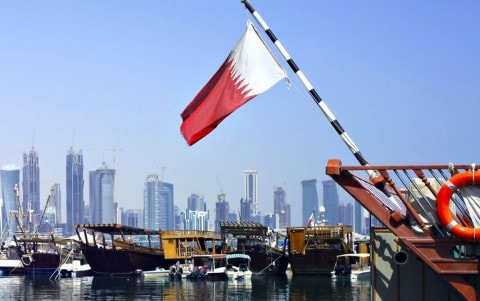Gulf diplomatic tensions show signs of easing
The latest developments in diplomatic tensions in the Gulf region are beginning to show signs of cooling down.
In a recent speech, Saudi Arabian Foreign Minister Adel al-Jubeir expressed hope on June 13 that Qatar would respond to Saudi Arabia's requests to overcome the current crisis.
 |
| Diplomatic tensions in the Gulf region show signs of easing. (Illustration photo: Reuters) |
Mr Jubeir said the solution was in Qatar's hands, adding that border closures had been lifted to allow families to reunite and that Saudi Arabia would send food or medical aid if needed.
However, the Saudi Foreign Minister stressed that whether the crisis will be a breakthrough or not will depend on Qatar's response to stop supporting extremism and interfering in the internal affairs of countries.
The diplomat also recalled that US President Donald Trump had also called on Qatar to immediately stop supporting terrorism. In a related move, UAE Foreign Minister Anwar Gargash said that the "key" to resolving the dispute between Arab powers and Qatar was to reject extremism and terrorism.
Also on June 13, Egypt's Civil Aviation Authority said that the country will allow airlines and aircraft not registered in Egypt or Qatar to use its airspace to travel to Qatar.
Specifically, the ban only applies to all Qatari airlines and Qatar-registered aircraft landing in Egypt and is not allowed to transit through the country's airspace and vice versa.
The Civil Aviation Authority noted that the decision does not include airlines and aircraft not registered in Egypt, or the State of Qatar, that wish to pass through Egyptian airspace. Civil aviation authorities in Saudi Arabia, the UAE, and Bahrain have previously made similar statements.
Meanwhile, shuttle diplomacy activities of countries in the region such as Jordan and Kuwait are still taking place actively. The international community has responded with the hope that the parties involved will resolve tensions through dialogue to bring security and stability to the Gulf region.
In another development, the Saudi Arabia-UAE Coordination Council will hold its first meeting in Jeddah tomorrow (June 15) to discuss new developments in the region, especially the current crisis with Qatar. The agenda of the conference will review the results of joint cooperation in politics, military, security and economy.
Notably, the conference took place about 10 days after the Gulf crisis with the greatest tensions in the history of the Gulf Cooperation Council bloc since its establishment in 1981.
On June 5, Saudi Arabia, Egypt, Bahrain, and the UAE simultaneously severed diplomatic relations with Qatar and closed air, sea, and land routes because they believed Qatar had supported terrorist groups and interfered in the internal affairs of countries in the bloc. However, Qatar has denied these accusations.
According to VOV
| RELATED NEWS |
|---|
